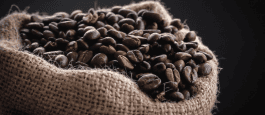
Take for example, dalgona - a whipped milk beverage topped with a coffee froth, a mix of instant coffee powder, sugar and hot water in equal proportions. It's an Instagrammable coffee drink that is just as deliscious and visually appealing, and is populating the social media feeds of many Berliners.
Statista, a German company specialising in market and consumer data, tells us that coffee is the most popular hot beverage in Germany, the country being ahead of Italy and Belgium in coffee bean import. Berlin is a Mecca for specialty coffee. It was Erna Knutsen, the legend of the coffee industry, who coined the term “specialty coffee”. She elevated coffee from mass-market drink to an art form, pointing out its history, the importance of the region of origin, the fact that coffee becomes more sophisticated and elegant when the terroir, the micro-climate of the plantation, the roasting, and the blend are taken into account.



Images: Unsplash, Dolgana Coffee Oana Cristina
Images: Instagram, @thebarnberlin
Images: Instagram, @roesttätteberlin
Ordering an espresso, as baristas would suggest, is a good way to start assessing Berlin's coffee houses. Espresso is all about the tech details: highly pressurised boiling water is forced through ground coffee beans for 20-25 seconds, resulting in 35-40 ml of coffee with a thick creamy froth.
Flat white, a drink devised in Australia, is a double espresso topped with frothed milk. Flat white has more intense coffee flavor than latte, the biggest and milkiest of espresso-based drinks. Half way between flat white and latte, maintaining the right balance of coffee and milk flavors, is cappuccino.
Espresso mixed with frothed milk 1:1 is called cortado, and it's of Spanish tradition.
All these drinks are made traditionally, using a coffee machine. Many alternative methods exist, and you'll come across them at specialty cafés. They include filter coffee, French press, and aeropress. Like wine in an opened bottle, coffee would develop its flavor as you're drinking it.
We support the philosophy of conscious consumption, looking for the best coffee there is. Here's our list of specialty cafes in Berlin, where you can enjoy a premium coffee experience.



Images: Instagram, @fiveelephant
Images: Instagram, @bonanzacoffee
Images: Instagram, @benrahimcoffee
Isla Coffee Berlin is a charming cafe, tucked away from the hustle and bustle of Hermannstraße. Its leafy terrace and clean and modern interior invite you to try their specialty coffee and food with a focus on delicious, seasonal ingredients. What makes this place so special is the adoption of a circular economy and waste-management system. For example, they turn their leftover steamed milk into fresh ricotta cheese and bread pudding, used for their brunch menu.
The Barn, founded in 2010, is the biggest chain of specialty cafés in Berlin, with over ten establishments in the city. The chain holds the «Best Specialty Coffee Roaster Europe&Middle East 2019» title and offers, besides coffee, their trademark muffins and biscuits.
Two Mitte-based Röststätte Berlin cafés select and roast their beans since 2003, and they trade in coffee-making equipment too. You can take a course at their Barista Academy and get a degree in coffee culture.
Bonanza Coffee has three establishments in different corners of Berlin, offering an enjoyable “third wave” coffee experience and impeccable interior design. Takeaway pastry on offer by La Maison bakery (Monday to Wednesday) or by Salon Sucre (Thursday to Sunday).
Ben Rahim, a coffee house with an Arab accent, is tucked away in the backyards of Hackesche Höfe. They serve rose and cardamom lattes, cezve-brewed Turkish coffee with a date, and flat whites. In addition to their coffee offerings, you can choose from a selection of sandwiches and bowls to take away. Unlike many other places, you can also order online for delivery via Uber Eats or Wolt.
The Five Elefant chaps have been searching for and roasting the best coffee beans since 2010. Their five environmentally and socially conscious cafés, which include a deli, serve some of the best coffee in Berlin. A perfect match is their cappuccino paired with a slice of Philadelphia cheesecake.
As the saying goes, coffee is the new wine. We wish you all a sunny Berlin summer and hope you enjoy only the tastiest coffee!
Related Articles: